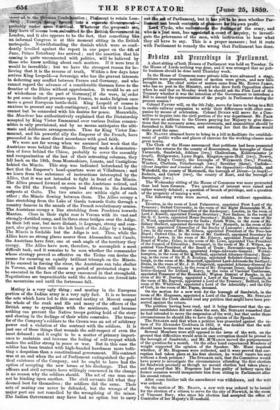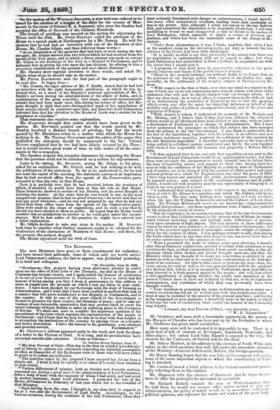Dtkatti anh xurubing in orlinnitut.
A short sitting of both Houses of Parliament was held on Tuesday. In the House of Lords nothing was done, and it was arranged that no pub- lic business should be done until Thursday week.
In the House of Commons some private bills were advanced a sta, petitions were presented, notices of motion were given, and new bills brought in. The chief notice of motion came from Mr. EDWIN JAMES, who has no post in the Ministry, and who drew forth Opposition cheers when he said that on Monday week he should ask the First Lord of the Treasury whether it was the intention of the Government to introduce a Bill to amend the representation of the people in Parliament during the present session? Colonel PATTEN will, on the 5th July, move for leave to bring Ma Bill to enable railway companies to settle their differences with other com- panies by means of arbitration. Colonel DUNNE will move for a Com- mittee to inquire into the civil portion of the war department. Mr. Pam will move an address to the Crown praying her Majesty to give direc- tions that the necessary arms, accoutrements, and ammunition should be furnished to Rifle Volunteers, and assuring her that the House would make good the same. Mr. BLANEY obtained leave to bring in a bill to facilitate the establish- ment of public walks and places of exercise for the working-classes near great towns. The Clerk of the House announced that petitions had been presented against the returns for the county of Roscommon, the boroughs of Great Yarmouth, Sandwich, Athlone (two ) Cheltenham, Kidderminster (a laugh), Bridgewater, Lyme Regis, Kingston-upon-Hull (two), Newry, Frome' King's County, the boroughs of Weymouth (two,) Preston, Windsor, Chatham Peterborough (two,) Beverley (three), Carlisle— (Great Laughter and ironical cheers from the Opposition)—Dundalk, and Wakefield, the county of Merioneth, the borough of Dover—(a laugh)— Bodmin, and Carlow (two), the county of Kent, and the borough. of Barnstaple (two.)
The Wednesday sitting of the House of Commons was more protracted than had been foreseen. Two questions of interest were raised and rather warmly debated; a question of breach of privilege, and a question of the propriety of issuing a writ.
The following writs were moved, and ordered without opposition. For— Tiverton, in the room of Lord Palmerston, appointed First Lord of the Treasury; Oxford University, in the room of the Right Honourable W. E. Gladstone, appointed Chancellor of the Exchequer; London, in the room of Lord J. Russell, appointed Foreign Secretary; New Radnor, in the room of Sir G. C. Lewis, appointed Home Secretary; Halifax, in the room of Sir C. Wood, appointed Secretary for India; South Wilts, in the room of Mr. Sidney Herbert, appointed Secretary for War; Morpetb, in the room of Sir G. Grey, appointed Chancellor of the Duchy of Lancaster ; Ashton-under- Lyne, in the room of Mr. M. Gibson, appointed President of the Poor-law Board; Oxford City, in the room of W. Cardwell, appointed Secretary for Ireland; Lewes, in the room of Mr. Fitzroy, appointed President of the Board of Works ; Caine, in the room of Mr. Lowe, appointed Vice-President of the Council of Education; Devonport, in the room of Mr. J. Wilson, ap- pointed Vice-President of the Board of Trade ; Newcastle-upon-Tyne, as the room of Mr. Headlam, appointed Judge-Advocate-General; Wolver- hampton, in the room of Sir 4. Bethell, appointed Attorney-General ; Read- ing, in the room of Sir H. S. -Keating, appointed Solicitor-General; Edin- burgh, in the room of Mr. Moncrieff, appointed Lord-Advocate for Scotland; Emus, in the room of Mr. J. D. Fitzgerald, appointed Attorney-General for Ireland; Cork (County), in the room of Mr. Sergeant Deasy, appointed So- licitor-General for Ireland ; Kerry, in the room of Viscount Castlerosse, appointed Treasurer of the Household ; Wigton District of Burghs, in the room of Sir W. Dunbar, appointed a Lord of the Treasury; Clonmell, in the room of Mr. Bagwell, appointed a Lord of the Treasury; Bedford, in the room of Mr. Whitbread, appointed a Lord of the Admiralty; and the City of Cork, in the room of Mr. Fagan, deceased.
On the motion for a new writ for the borough of Sandwich, in the mom of Mr. Hugessen, appointed a Lord of the Treasury, Mr. STEUART moved that the Clerk should read any petition that might have been pre- sented against the return. The petition having been read, and it being discovered that the un- successful candidates did not claim the seat, Mr. STEUART remarked that he had intended to move the suspension of the writ; but that under these circumstances he should like to have the opinion of the Speaker. The SPEAKER said that when a petition was presented against the re- turn of Sir Alexander Cockburn in 1852, it was decided that the writ should issue because the seat was not claimed.
Several Members were still opposed to the issue of the writ, on the ground that difficulties would arise in case corruption should be proved in the borough of Sandwich; and Mr. WM/a:lox moved the postponement of the question for a month. On the other hand experienced Members of weight supported the opinion of the Speaker. Mr. Hunt inquired whether, if Mr. Hugessen were reelected, and it were proved that cor- ruption had taken place at his first election, he would vacate his seat without a fresh petition ? The SPRAERR said, that the Committee would have power to investigate the circumstances attending the first election for Sandwich precisely as though no second election had taken place ; and the proof that Mr. Hugessen had been guilty of bribery upon the former occasion would incapacitate him from sitting in Parliament after his second return.
After some further talk the amendment was withdrawn, and the writ was ordered.
On the motion of Mr. BRANT), a new writ was ordered to be issued for the election of a citizen to serve for the city of Norwich, in the room of Viscount Bury, who since his election had accepted the office of Controller of her Majesty's Household.
On the motion of Sir WILLIAM doLarres, a new writ was ordered to be issued for the election of a knight of the shire for the county of Mon- mouth in the room of Colonel E. A. Somerset, who since his election had accepted the office of Steward of the Chiltern Hundreds. The breach of privilege was mooted on the motion for adjourning the House until the 30th. Mr. OWEN STANLEY called the attention of the House to a speech made at Northampton by a Mr. Dennis. He told the electors that he had had an interview with one of the Members of that House, Mr. Charles Gilpin, and then followed these words-
" As an illustration of the agencies that had been at work during the late struggle, Mr. Gilpin showed him two letters which he had received from the agents of the Tory party, and in which a direct attempt was made to corrupt Mr. Gilpin in the discharge of his duty as a Member of Parliament, and to influence him in giving his vote upon the last division, by offering to him a pecuniary consideration of the grossest and most direct character." Mr. Stanley drew especial attention to these words, and asked Mr. Gilpin what steps he should take in the matter. Mr. Pnrsa BLACKBURN said the first part of the paragraph ought to be read also. It began thus-
" Mr. Dennis, the legal adviser of Mr. V. Smith, stated that he had had an interview with the right honourable gentleman, at which he was in- formed that, as a mark of her Majesty's personal appreciation of Mr. V. Smith's servioes during his administration of the album of India, and in consideration of the gross scurrility, foul abuse and moat unwarrantable attacks that had been made upon him during his tenure of office, her Ma- jesty thought it right that some distinguished mark of her approbation of those service should be conferred upon him, and therefore Lord Palmerston informed him that his elevation to the House of Lords was a matter for his acceptance or rejection."
That statement also requires some explanation.
Mr. HADFIELD thought that notice should have been given to the parties. Mr. BOVVERIE pointed out that the words quoted by Mr. Stanley involved a distinct breach of privilege, but that the words .quoted by Mr. Blackburn relate to a matter with which the House has 'nothing to do. Mr. THOMAS BUNCOMBE said the editor of the paper that published the statement should be summoned to the bar. Colonel 3)nziers complained that he too had been falsely accused by the Times; but it would involve great waste of time to take notice of all the state- ments in the newspapers.
The Speaker stopped this irregular discussion by reminding the House that the question could not be introduced on a motion for adjournment.
Later in the sitting, Mr. ST.tamsr, seeing Mr. Gilpin in his place, asked for an explanation. Mr. GLLPIN said he had nothing to do with the publication of the statement. So far as he understood it, for he had not read the report of the meeting, the statement conveyed an impression that he had received offers from the agents of the Conservative party intended to bias his vote in that House.
Now, it is perfectly true that he had received letters the tendenoy of which, if attended to, would have been to bias his vote in that House. Those letters he showed to certain of his friends, and he never thought of reviving the matter. At the same time he was bound to say, in the most unequivocal manner, that he bad no proof whatever,—he never said that he had any proof whatever,—and he was not prepared to say that he had any belief that these offers came from the agents of the Conservative party. They were made in the shape of suggestions and in such a way that he should not have alluded to them in public. He hoped that the House would consider this as satisfactory an answer as he could give under the circum- stances. Had he had notice of the question he might have entered into a fuller explanation.
Mr. Gilpin declined to take any steps in the matter. M. SersisLEr took time to consider what further measures ought to be adopted for the vindication of the diameters of Members of that House ; and there, for the present, the subject dropped. The House adjourned until the 30th of June.

























 Previous page
Previous page